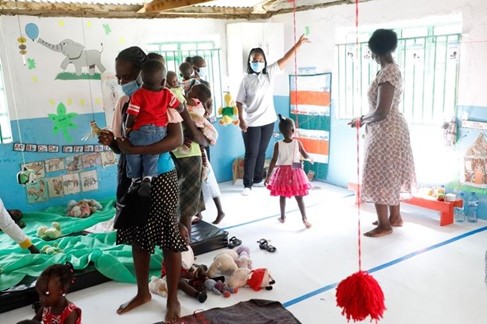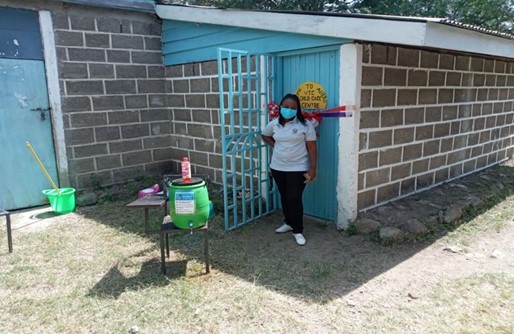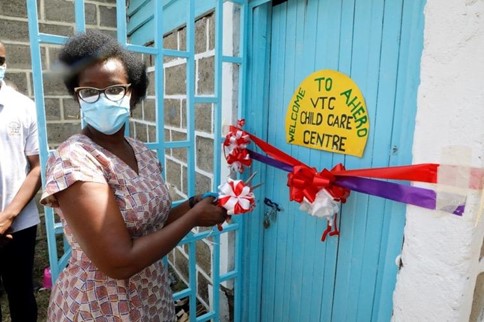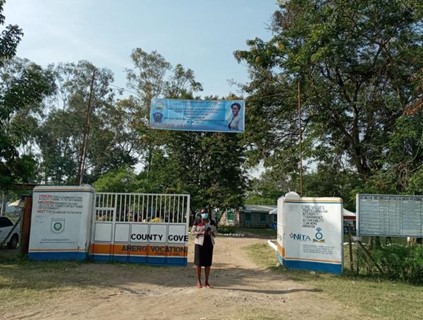
Childcare in Vocational Training Centres - Making Care Count
Kidogo, Kenya
Overview
Pregnancy among youth women is an ongoing challenge in many developing countries. Africa has the highest adolescent pregnancy rate in the world, according to Human Rights Watch and adolescent girls who have early and unintended pregnancies face many social and financial barriers to continuing with formal education.
In Kenya, many of these vulnerable young mothers enrol in a Vocational Training Centre (VTCs) following the birth of their babies, giving them an opportunity to access empowering training programmes. The country experienced an increase in adolescent pregnancies during the Covid-19 pandemic, with 152 000 adolescent women becoming pregnant during a period of six months. This increase highlighted the need for proper child care, since with no quality and affordable childcare options, the young women are forced to bring their children to class with them. This hinders both the mothers’ learning abilities, leading to high dropout rates, and the development of their babies and young children.
To address the challenge of adolescent mothers needing to care for their children, Kidogo, a social enterprise providing high-quality, affordable early childhood care and education for families living in Africa’s urban slums, collaborated with three VTCs — Ahero, Akado and Obange — to launch a project in April 2021. The project’s objective is to provide quality, affordable early childhood care that supports young mothers to continue their education, while giving young children a solid start to life.
Good Practice Approach
Kidogo signed an MOU to provide childcare at Kisumu county TVET centres. There are 26 centres in Kisumu county, located in the West of Kenya near Lake Victoria, where young women are able to obtain skills development to better their lives and economic circumstances. However, when these young women become mothers they can either bring their child to school with them - which has led to dropouts or leave their child in an unsafe day-care environment. This is where Kidogo comes in: to ensure that young mothers don’t have to choose between going to school and taking care of their little ones.
Kidogo mapped seven centres for the pilot VTC in Kisumu County in Kenya. These were narrowed down to three centres (Obange, Ahero and Akado) as the pilot project, according to an assessment of the greatest need for childcare. Managers of these vocational centres were briefed to secure their support, and three caregivers were recruited and trained. During a 6 month period Kidogo completed centre renovations and hired and trained caregivers. The launch took place on 3 June 2021. There are plans to expand the implementation of this project to the additional 23 centres in the county. As part of the agreement, the County TVETs will provide the childcare space and Kidogo will train the caregivers.
Key Results
During the pilot adolescent mothers’ project at the three VTC centres, Kidogo reached 60 children and their young mothers benefited from the pilot – with mothers being from 18 – 25 years old and children from 7 weeks – 3 years old.
Key results are:
● An increase of female participation in highly technical male dominated skills training such as electrical, automotive engineering, plumbing etc.
● 95% of student mothers have enrolled their children in these childcare centres.
● 38% of new students said the childcare centre was a decision factor in enrolling in the VTC and VTCs reported a 33-50% increase in enrolment of young mothers.
● All 3 pilot centres reported that they’ve not experienced any drop outs among young mothers.
● Pilot VTCs have noted higher female attendance rates, improved performance and decrease in shame/embarrassment among young mothers.
● Some students expressed that they feel their performance in school has improved.
● There has also been an increase in interest in enrolment at the VTCs since the day care facilities were set up.
● Attendance rates have improved.
● Young mothers reported reduction in stress levels.
● Improved concentration due to reduced interruptions was also reported.
Lessons Learnt
Success Factors
● Building relationships with VTC management, community health volunteers and board of governors in each institution so that they see the need among the young mothers in the community.
● Support from young women and adolescent girls who drop out of school because of early pregnancy.
● Goodwill from the local political leadership who see project as an opportunity to promote gender inclusive youth empowerment.
Challenges/Barriers
● Covid-19 school closures slowed down the VTC pilot. The team mitigated this by building deeper relationships with VTC/County officials to ensure the project restarted when schools opened.
Moving Forward
Kidogo intends to scale up its social franchising model at the additional 23 VTCs in the county, before doing so to all VTCs in Kenya.
Resources
One of the Kidogo staff , Agnes Unzungu, spearheaded the establishment of the VTC in Ahero

Dorothy Nyongo, Kisumu Country's First Lady, opened the VTC child care in June 2021

Kisumu, Kenya VTC County Director Mrs Pachalia Ouma Presinding over the official launch of Childcare in Vocational training centre.


Website: www.kidogo.co
Instagram: kidogoearlyyears
Twitter: Kidogo_ECD
Youtube: Kidogo
Facebook: KidogoECD
5 Year Video: https://www.youtube.com/watch?app=desktop&feature=youtu.be&v=2ZXAUflvcqE
Contact: Email: info@kidogo.com


